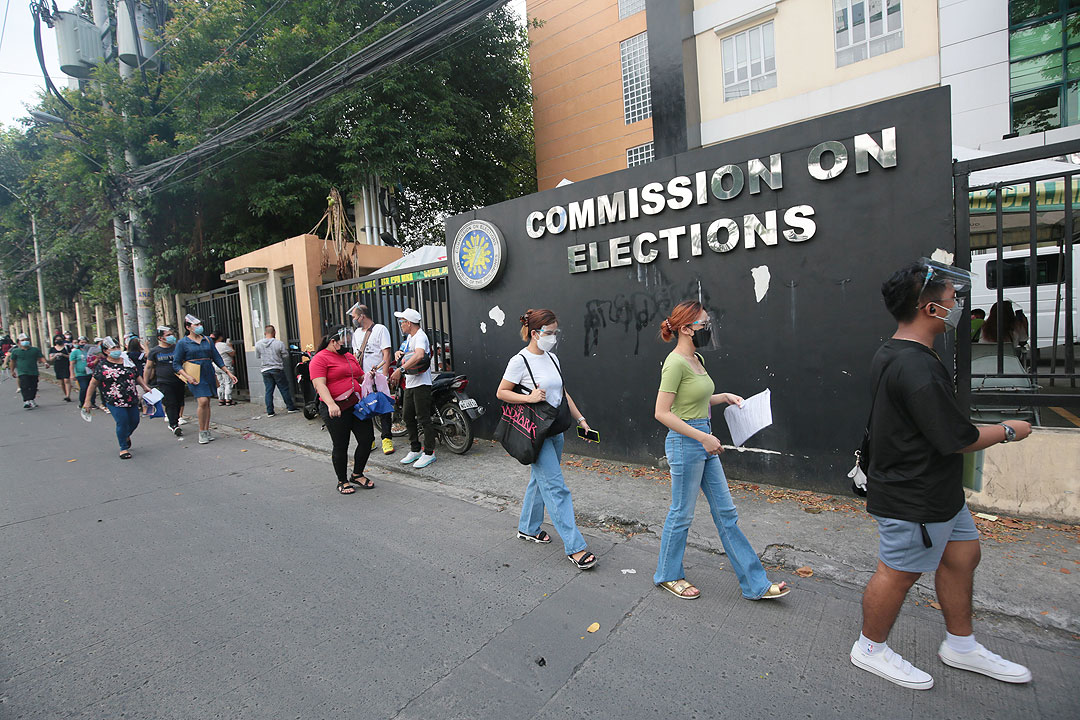Electoral risks heightened as more politicians deploy technology for campaigns
Electoral risks heightened as more politicians deploy technology for campaigns
Electoral risks heightened as more politicians deploy technology for campaigns
October 14, 2021 12:32 am

Arjay L. Balinbin,
Senior Reporter
THE NATIONAL Telecommunications Commission (NTC) on Wednesday admitted it is “very difficult” to stop groups or individuals from using equipment such as text blast machines for political campaigns ahead of the May national elections.
“This is alarming. This came to light after the alert message that was sent last week,” NTC Deputy Commissioner Edgardo V. Cabarios told
BusinessWorld
in a phone interview on Wednesday, referring to the recent emergency alert that announced the presidential candidacy of Ferdinand “Bongbong” R. Marcos, Jr.
Mr. Cabarios said they suspect the text blast machines sold on e-commerce platforms such as Lazada and Shopee and even on social media platform Facebook were “among the possible sources of the emergency alert.”
The regulator ordered Facebook, Inc., Alibaba’s Lazada Group, and Sea Ltd.’s Shopee to stop selling the equipment, as well as required them to explain why they should not be held liable for violating Act 3846, or the Radio Control Law.
Mr. Cabarios acknowledged the difficulty in going after those who have already purchased the equipment.
“It’s very difficult because they are just sending the message in a few seconds, and then they turn off the equipment, so how do you pursue them? They move from one place to another. Very, very difficult,” he said.
He said the NTC is now considering conducting an information drive to warn the public about these unsolicited text messages, and coordinating with the Customs bureau on imports of these equipment.
The NTC did not anticipate that these text blasters would be sold online, Mr. Cabarios added.
On Lazada, the SMS text blast software was being sold for P13,500, while the SMS text blast system was priced at P120,000 and SMS location blasting system for P230,000 with free delivery.
“At Lazada, customer safety is our top priority. We have removed the products highlighted in the NTC report on Oct. 7. Our team does a daily manual sweep for product listings that violate existing policies and these are removed once identified. Strong action is also taken against sellers found breaching our platform’s terms and conditions,” Lazada Philippines said in an e-mailed statement.
For its part, Facebook said it will work with the “relevant authorities to receive take down requests on any listings that are locally unlawful in the Philippines.”
“When we receive a report from the appropriate legal authority about unlawful content, we will review and take appropriate action,” it added.
The Customs bureau and Shopee have yet to respond to a request for comment as of press time.
Text blasters, according to Mr. Cabarios, use the frequencies allocated for the mobile networks. He also noted that the device can be used to spread “fake news” or fake emergency alerts during elections.
“That is why this is prohibited; in 2013, we prohibited the use of this already,” he said.
In general, election laws of the Philippines have yet to catch up with the rapid technological developments, according to the National Citizens’ Movement for Free Elections (Namfrel).
“The technologies used like the text blaster, if you look at the election laws, are not illegal but there are restrictions to commercial application by the NTC,” Namfrel Secretary-General Eric Jude O. Alvia said in a phone interview.
The use of new technologies by politicians before the campaign period is also not illegal, Ateneo de Manila University election law professor Alberto C. Agra said in a separate phone interview.
According to the Commission on Elections (Comelec), the official campaign period for national positions runs from Feb. 8, 2022 to May 7, 2022. Election day is May 9, 2022.
“Can the Comelec, without a law, regulate social media? For TV, radio and print, there are maximum number of hours and size (of ads), but for social media, there’s no law,” he said.
Namfrel’s Mr. Alvia said putting restrictions on the expenditures of candidates may not be the ideal solution to curtail the misuse of technology as well.
“If you would put a cap on resources, it would not level the playing field for those candidates who may abide by restrictions but don’t have access to [the platforms],” he noted.
“Social media should be regulated by the application of fair election laws. You also have to monitor the use of that media for its content. What is being purveyed in that media? Is it the truth or not? Who will do it? Does the Comelec have the manpower or capacity or the resources to do it? This is where the citizens come in. This is where the owners of the platforms exercise their responsibilities.”
On the possibility of cyberattacks during the elections, Mr. Alvia said there are other laws that are contained in the country’s electoral laws which would protect the election system.
“The Data Privacy Act and the E-Commerce Law would protect us from the misuse of technology aimed at undermining the count or election results. [But] if you look at our election laws, these are very broad and very vague at times that I could say that [we] still lack transparency,” he said.
Internet security firm Kaspersky said in an e-mailed reply to questions that “new technologies have the potential to be hacked.”
“But voting systems can and should be fixed by using technology that can secure and ensure transparency. To increase the public’s faith and trust in election systems, it will require collaboration between public and private organizations,” it added.
